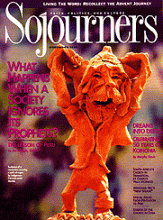Clint Eastwood's latest film, Unforgiven (Warner Bros., 1992) has beautiful shots of Canada (set in Wyoming, filmed in Calgary), a few violent scenes, some wonderful acting, a title with a dual meaning, and an identity problem.
Written by David Webb Peoples, produced and directed by Clint Eastwood, Unforgiven tells the story of William Munny (East-wood), a legendary outlaw who, when the film opens, had married 12 or 13 years earlier and put down his guns for the shovel of a pig farmer. But Munny's saintly wife has died, leaving him with two children and a herd of sick pigs.
The Schofield Kid, an obnoxious young gunslinger (Jaimz Woolvett), arrives at the squalid Munny farm and tries to entice the melancholy reformed man to join him on a mission of revenge. The reward is too good to pass up, so Munny leaves his children and rides off to ask his old partner Ned Logan (Morgan Freeman) to accompany him. Despite the silent but strong protest of Logan's Indian wife, the two take off to find the Kid.
The plan doesn't go well: Munny fumbles getting on a horse; the Kid has lousy eyesight for a gunman; Logan loses his ability to shoot at people. And then there's a sadistic sheriff, Little Bill Daggett (Gene Hackman), to contend with.
Read the Full Article

